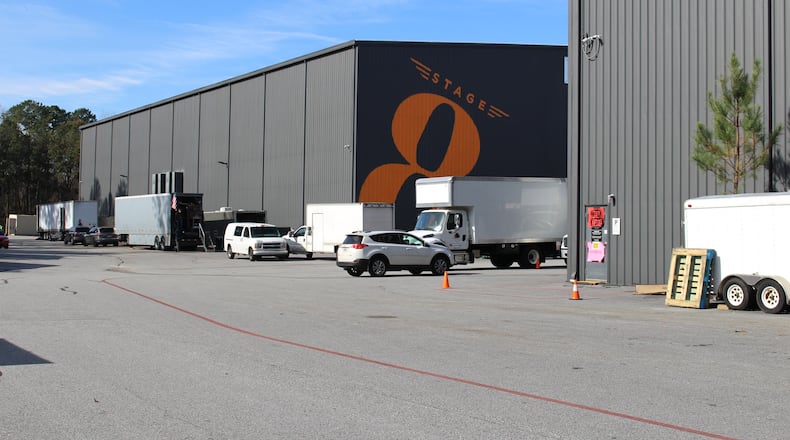The Decide DeKalb Development Authority has unanimously approved a hefty incentives package that officials say will help make Blackhall Studios the largest film production complex in the state — and fuel an expansion project marking the largest-ever investment in the southern end of the county.
The inducement resolution approved during a Thursday morning meeting offers Blackhall, which has operated near I-285 and Bouldercrest Road in southwest DeKalb since 2017, a conventional $34 million tax break over 20 years.
The studio would also receive an additional $34 million “infrastructure credit” that officials said would help offset the cost of the studio addressing the “extraordinary and challenging infrastructure and topography needs” on the expansion site, which covers 155 undeveloped acres south of its current operations.
In exchange?
Blackhall — which is controlled by California-based Commonwealth Real Estate LP — would invest an estimated $380 million and bring more than 2,400 film- and production-related jobs to an area that’s long wanted for economic development, officials said.
The expansion would more than double the studio’s existing square footage, putting it at over 2 million square feet. It would go from its nine current soundstages to a total of 35.
“This landmark development represents the largest ever investment in South DeKalb that will create a training pipeline to high-paying careers and expand economic opportunities that open the door for more retail, restaurant, and industry options for the community,” Dorian DeBarr, president of Decide DeKalb, said in a statement provided to The Atlanta Journal-Constitution.
“This historic investment speaks to Commonwealth’s long-term commitment to the people in South DeKalb and we could not be more thrilled about this dynamic project.”
Officials said Commonwealth has “created strategic partnerships” with DeKalb’s workforce development program, the Georgia Film Foundation and the Georgia Film Academy that will help get local residents into the industry if they’re interested. The studio will also expand existing partnerships with the county school system and local technical colleges to help fill the pipeline.
Commonwealth also agreed to invest $7.5 million in a new “Community Progress Fund,” officials said. Decide DeKalb and a committee of local stakeholders would work together to deploy the funds to benefit the county.
The developer is also working with parks officials and other experts to explore the feasibility of a mile-plus walking trail that would be adjacent to the site and connect to other amenities in the area.
“We see this as a community project as much as a business project,” Jeff Weber, who oversees development for Commonwealth, said during Thursday’s development authority meeting.
The dramatic expansion plan took its first concrete step in March 2021, when developers working with the studio applied for permits with the county. Blackhall founder Ryan Millsap sold the studio, which retains its original name, less than two months later.
That deal raised plenty of questions about the future of the project, but Commonwealth officials vowed to push forward.
Credit: SPECIAL PHOTO
Credit: SPECIAL PHOTO
The expansion project given the go-ahead Thursday would be built south of existing campus off Constitution Road.
It does not involve the handful of properties just to the north that Millsap, the Blackhall founder, acquired in a controversial 2020 land swap with DeKalb County.
While the county parkland that Millsap acquired in the swap was also pitched as room to accommodate Blackhall’s future growth, it was not included in the sale of the company. Millsap retains control of the property.
Environmental advocates have filed a lawsuit over the land swap, which is still pending in DeKalb County Superior Court. Judge Stacey K. Hydrick denied the county’s motion to dismiss the suit last month.
The $68 million incentive package being offered by Decide DeKalb is significant. But officials are relying on a fiscal impact analysis conducted by the Georgia Tech Enterprise Innovation Institute which projected that, even during the 20-year incentive period ending in 2044, the county and its school system could net $53 million more in property tax revenue than if Blackhall did not expand on the currently unused property.
An total estimated cost of infrastructure improvements required for the site was not provided. Officials said the work include removing bedrock, installing utilities and building two bridges to cross a river dividing the existing campus from the larger site.
J.C. Bradbury is a professor of economics at Kennesaw State University and frequent critic of both development incentives and the lucrative state film tax credits that have fueled Georgia’s emergence as a player in the industry.
“Development incentives are supposed to attract new business that would otherwise not be occurring absent the incentives,” Bradbury said. “The studio is already in DeKalb and is heavily incentivized to be in that location because of Georgia’s generous subsidies through film tax credits.”
(Weber, the Commonwealth official, said Thursday the studio does not directly apply for film credits but the production studios that act as Blackhall’s tenants do so.)
Bradbury also questioned the number of jobs that would purportedly be created, saying it would equate to about 15% of all film jobs in Georgia.
DeKalb County Commissioner Ted Terry, whose super district includes the area in question, said he ultimately supports the project but, among other things, has asked for sustainability and ecological improvements on the site.
Fellow Commissioner Larry Johnson, who has represented southwest DeKalb for two decades and championed Blackhall’s expansion, said he was looking forward to the “evolution and transformation” it would bring.
“To witness the largest investment in South DeKalb’s history, in a community that has often times been overlooked, is truly remarkable,” Johnson said.
Once construction starts, work would take about 30 months, Weber said Thursday.
About the Author
Keep Reading
The Latest
Featured



